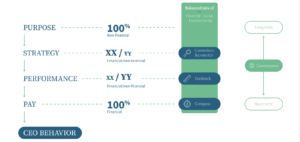Dear Andrew,
In response to your article of last Monday’s Financial Times “Executive pay and climate: can bonuses be used to reduce emissions?”, I am writing you this letter.
The main question asked in your article is about the purpose and effectiveness of monetary rewards as a way of changing corporate behaviour. At Reward Value Foundation, we are dedicated to research the effectiveness of incentive pay for chief executives in support of the transition to a regenerative and inclusive economy. It starts with the observation that there is a wide gap between corporate purpose and executive pay. As outlined in the picture here below, corporate purpose is mostly formulated in fully long-term non-financial objectives. Looking at executive pay, it is at most companies almost fully linked to short- term financial performance. How can companies strive to be or become sustainable contributors to societal long-term value creation, when their chief executives are remunerated on short-term goals often conflicting with long-term value creation for all stakeholders, including shareholders? Whereas purpose has evolved taking the challenges of today and tomorrow into account, pay has remain unchanged except for the level of pay. This gap has to be addressed. What analysis is needed?

In the assumption that pay reflects a performance1, the first question to ask is what performance should be remunerated? This requires a renewed definition of corporate success, which should entail the impact of the company on society both from a financial perspective and from a non-financial perspective (environment and social). The success of an organisation should be measured according to financial, environmental and social impact. Ideally, the environmental and social impact is monetized to allow an overall assessment in the same currency with the financial impact. The approach of the Impact Weighted Accounts Initiative of the Harvard University is a strong tool for this.
Next to a quantitative analysis based on impact measurement, a qualitative assessment of corporate activities is needed, whereby the materiality of the sustainability strategies of companies is key, as research has also demonstrated that only the material sustainability topics add value on the long-term2. Many corporate governance codes require companies to contribute to long-term value creation. Often the definition of long-term is not given. Especially, when pay is structured in shares (as also recommended by Prof. Alex Edmans), it is important to understand when share valuation is a fair reflection of a company’s accounting valuation (both financial and non-financial). As you can see in the picture here above, Reward Value performs research on these three elements of long-term value creation, being quantitative impact analysis (Impact Yardstick), qualitative strategic analysis (conviction barometer) and definition of long-term (convergence).
The subsequent next important analysis to make is whether renewed remuneration design will impact executive and corporate behaviour. According to research, executives at least seem to demonstrate short-term oriented behaviour around vesting moments of incentives.3 By means of experimental research, Reward Value is exactly examining this question. Our research is on-going, and it is too early to tell whether it will be effective, but the analysis needs to be made before any conclusions, as made in your article by some, can be made.
Finally, renewed executive remuneration also needs renewed corporate governance and strict and mandatory reporting. In addressing al these questions, the red flags mentioned in your article are dealt with. Moving executive remuneration away from short-term financial coupled with vague non-financial targets to long-term sustainable value creation with transparent mandatory reporting will in our view result in a better alignment of pay with purpose. The experimental research will be able to give more insights in the effectiveness of executive pay in changing corporate behaviour. Executive pay will never be the solution to all, but structured well it good become a catalyst for change. From Reward Value Foundation, we invite academics and market parties to participate in and contribute to our research.
1 Gabaix, Landier, and Sauvagnat (2013), CEO Pay and Firm Size: An update after the crisis. Frydman & Saks (2008), Executive Compensation: A new view from a long-term perspective, 1936 – 2005.
2 Serafeim, Kahn, and Yoon (2016), Corporate Sustainability: First Evidence on Materiality.
3 Edmans, Fang, and Lewellen (2017), Equity Vesting and Investment.
